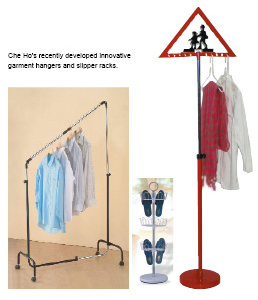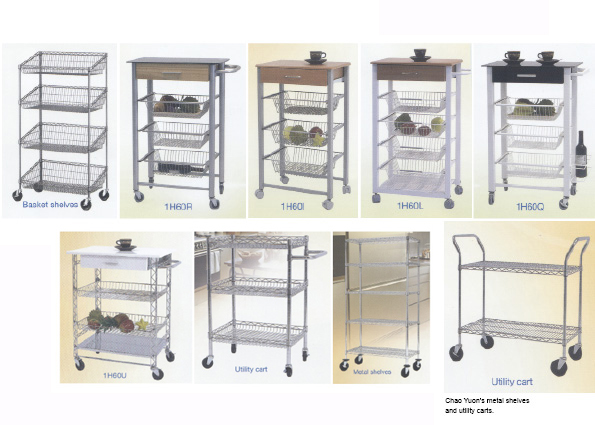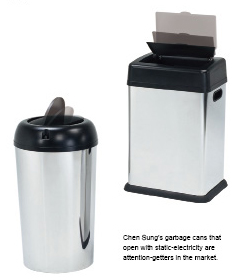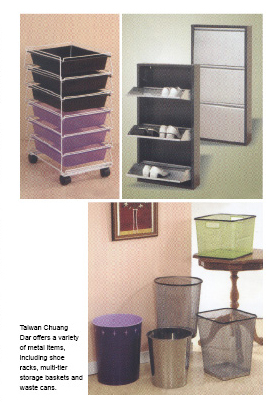Taiwanese Metal Furniture Makers Use Mixed Strategies to Stay Competitive
2010/01/05 | By Judy LiThe overall scale of the furniture industry in Taiwan has been downsized over the last two decades due to makers' moving offshore to offset rising costs at home; but such is not true of the entire sector for some have kept their operations on the island due to various factors, not the least of which is the home advantage, as well as distrust of new environments and negative reports of Taiwanese entrepreneurs' fate once having set up shop abroad.

Among other challenges, surging material prices have forced metal furniture makers in Taiwan to survive by going upmarket, designing innovative items of quality materials to fetch higher margins. In addition, the makers are able to stay globally competitive by tapping advanced technologies, locally-sourced materials, and well-established subcontractors around the island, as having convenient and nearby access to such resources helps to minimize costs and maintain effective QC.
Founded in 1993 Che Ho Co., Ltd. is a typical metal furniture maker in Taiwan turning out a variety of items, including shoe racks, garment trees, display stands, hangers, occasional tables, magazines racks, garment racks, adjustable footstools, kitchen shelves, cabinets etc.
Clustering in Cntral Taiwan
The company has a factory of 6,600 square meters in Changhua, central Taiwan. "Many metal furniture makers cluster in central Taiwan because of the nearby subcontract machine shops, which is also why we are set up here," explains M.J. Shih, the president.
"Our products are mostly of stainless steel, aluminum alloy and zinc alloy, which are locally sourced. We had been able to buy metals at stable prices over the first 10 years, but prices of metals have been steadily rising in recent years," says Shih.
"Prices of metals this year have surged more than 50% compared to two or three years ago, hence slashing profits since we have absorbed such rises. Moreover, the global recession has sapped demand so we have been seeing less orders this year," Shih laments.
Plus Che Ho has been facing increasing competition from rivals in China. "To cope we have sharpened manufacturing processes and invested considerably in upgrading R&D, as well as occasionally rolling out new products to meet changing tastes," Shih notes.
With about 50 workers that turn out different kinds of furniture to meet wide-ranging needs, the company exports all its output, with minimum orders being 200 pieces. "Despite the harsh manufacturing environment today, I believe we can make it through the hard times," Shih says.

Wire Furniture Specialist
After only some 13 years in the furniture industry, Chao Yuon Co., Ltd. has already built an enviable reputation for design and fabrication of wire furniture, including wire shelves, kitchen racks, dining carts, wardrobes, wire racks, storage carts, baskets, tier racks, hangers, hooks, TV stands, as well as castors and related accessories.
Bucking the popular trend to move offshore, Chao Yuon has stayed in Changhua county, central Taiwan, where it runs a semi-automated plant of around 3,700 square meters, with advanced machine tools to cut, bend, press, weld, fold and polish metal tubing and wiring. The plant is also equipped with special surface treatment equipment to finish metal surfaces against oxidation and corrosion.
As rival furniture makers in China gradually learn the tricks of the trade to catch up to Taiwanese operators, the makers on the island have had to stay vigilant, upgrading manufacturing technologies and processes to turn out high-quality items. "We have a 10%-20% manufacturing cost disadvantage relative to rivals in China," indicates Roy Ko, the sales manager. "To offset such disadvantage we have to streamline manufacturing processes and management, deliver promptly, and offer personalized after-sales service."
With years of efforts in upgrading operations, Chao Yuon is known globally for innovative, quality products, as well as becoming ISO 2000:9001-certified QMS. "Our well-trained QC team closely inspects manufacturing processes, for good quality is our basic guaranty," Ko emphasizes. "In addition, we don't cut back on R&D to stay in tune to global trends, enabling us to develop fashionable, innovative yet practical items."
Japan the Main Market
With a workforce of around 60-70 persons turning out some 60,000 to 70,000 pieces of wire and metal items monthly, the maker exports 90% of output and sells the remainder locally. "Japan is our major buyer by taking the lion's share of 60%-70% of export; while we also ship to the United States, European Union, and Asia," Ko states. "Though serving Japanese buyers is tough for their strict inspection procedures, but the rigors have been a blessing in disguise to force us to improve manufacturing technologies."
"Taking on orders and processing them involves ongoing communications with clients to clarify in detail what is truly wanted. Sometimes we have to act as design consultant, asking them to change ideas if their designs are impracticable, especially if they incur cost overruns," says Ko.
Insisting on being an honest, conscientious operator, Chao Yuon is well respected by customers. "I believe building mutual trust is essential for long-term business and we should always be compassionate," Ko says.
Established in 1987, Chen Sung Industrial Co., Ltd. specializes in making stainless garbage and trash cans. "About 25 years ago garbage cans are mostly of plastic or other traditional materials as bamboo and wicker. But Chen Sung is one of the few pioneers to make them out of stainless steel," says T.Y. Lin, the chairman.
Located in central Taiwan, the company has kept its integrated operations on the island, from product design, manufacturing to packaging. The boom in the 1990s saw the company hire more than 150 workers, which has plummeted to around 60-70 in recent years.

Over 1,000 Patents Won
"To fend off increasingly competitive rivals in China, we keep rolling out innovative, high-quality products, which have won more than 1,000 patents both at home and abroad," Lin says proudly. "R&D is the lifeblood of the company and I personally head the 5-designer team to brainstorm new products."
In August of this year Chen Sung unveiled a series of garbage cans whose lids open when users approach within 10 centimeters, triggered by static-electricity generated by human body, with the cans also installed with infrared radiation to enable sterilization.
Also the company started in the second half of this year to diversify its line to include kitchenware as storage shelves, cabinets, and display racks, all of which being of stainless steel.
Working with agents and traders, Chen Sung distributes products globally, shipping about 100 containers monthly mainly to the United States, Europe and Japan. "Besides being an OEM, we are also an ODM that develops made-to-order items," Lin adds.

Taiwan Chuang Dar Industrial Co., Ltd., established in 1972 in Taichung County, central Taiwan, is a specialist maker of hardware and metal items. In the first two decades the company made mostly fan guards, heater guards, industrial nets and related parts for local fan and heater manufacturers, diversifying only in the early 1990s into the furniture industry.
"Seeing the shrinking demand for hardware on the island since the early 1990s when domestic manufacturers migrated en masse to China, we therefore decided to go with the flow, expanding into China to move closer to our clients," says Joey Chiang, the sales manager.
In 1993 Taiwan Chuang Dar set up a hardware plant in Dongguan of Guangdong Province, China to serve Taiwanese clients that have moved there. A few years later the plant began to make metal furnishings, including stainless-steel houseware, storage racks, cabinets, garage cans, file baskets, waste baskets, as well various knock-down metal-tube furniture.
"Actually we established a wooden furniture plant in Beijing in 1992, a year before setting up the one in Dongguan. The plant in Beijing turns out only high-end wooden furniture in small volumes that are 100% exported to Japan and western Europe," discloses Chiang.
"Seeing the large market for metal products, we established a plant in Dongguan to make both hardware and metal furnishings. At its peak, the plant employed more than 1,350 workers, 95% of whose metal furniture output was exported and the remaining 5% supplied to IKEA's sales outlets in China."
Hit by Global Downturn
However, the Dongguan plant has been facing falling orders since 2004 due to the global downturn, with the situation worsening over the past couple years. To counter, the management has streamlined operations and enhances manufacturing efficiency, as well as downsizing the plant's workforce by almost half to about 700.
"Despite downsizing the workforce, we work with Taiwanese plants nearby in Dongguan to share personnel," Chiang explains. "For instance, when we need more workers during the peak season, usually from May to September, the partner Taiwanese plants will back us with their workers and vice versa."
"Our Dongguan plant ships about 100-150 containers a month on average, which may soar to 300-400 during the hot season," Chiang adds. "To enrich the line, we usually roll out new products every month, some of which developed in-house and others provided by customers."
Taiwan Chuang Dar still runs a plant in Taiwan with a workforce of around 30 persons, who turn out hardware to supply long-term clients locally. Chiang says that the company plans to move back some of the production lines from China in the near future, because Taiwan's manufacturing environment is better now, coupled with the advantage of direct Cross-strait flights.




